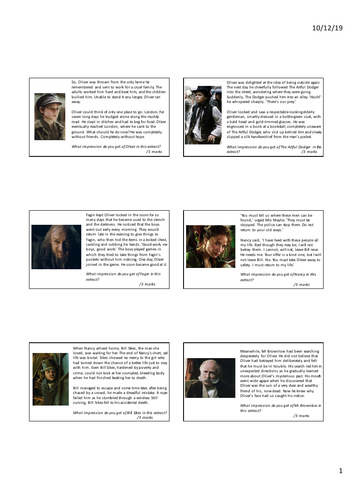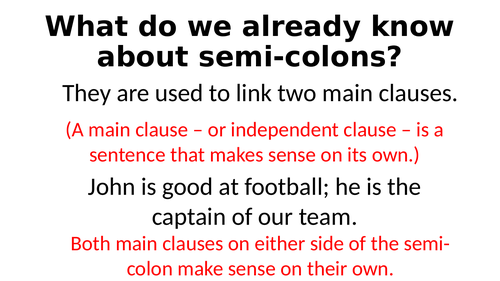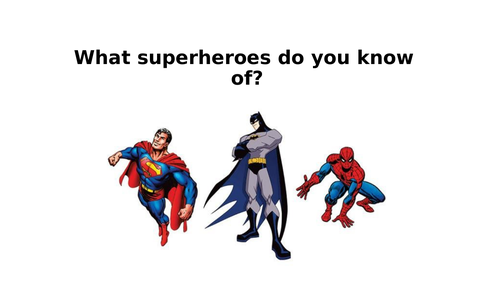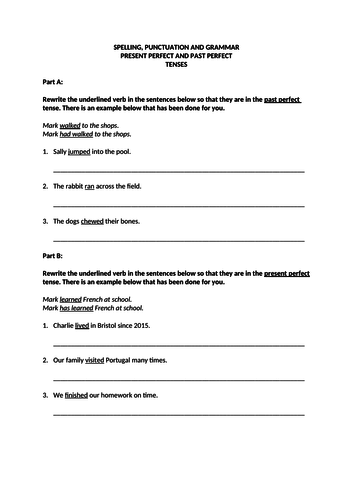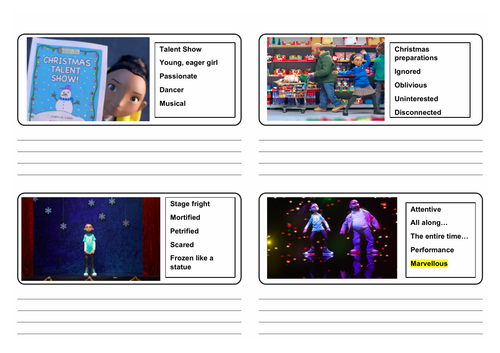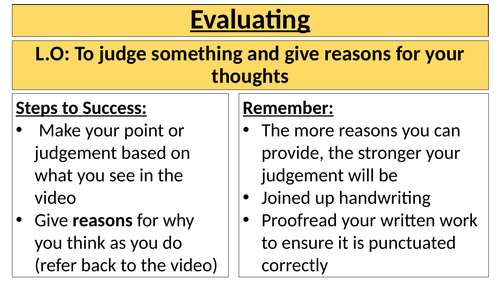
22Uploads
16k+Views
4k+Downloads
All resources

Year 6 SPAG - Is it a noun or a verb?
Great for Year 6 pupils in order to prepare for those challenging questions about nouns and verbs on their Spelling, Punctuation and Grammar SATs tests.
Three consecutive PowerPoint presentions exploring words that can be used as a noun or a verb, depending on the context of the sentence.
The ‘Day 1 PPT’ includes a short independent activity on the last slide.
The ‘Day 2 PPT’ includes a short independent activity as well.
The ‘Day 3 PPT’ provides a link to an external resource to consolidate learning.

Year 6 - Character Inferences - Oliver Twist
This is a Year 6 Reading lesson on making judgements about characters. Reference is made to the SATs-style question, whereby pupils have to give ‘impressions’ of a character (adjectives) and support them with evidence.
There are 6 excerpts related to actions undertaken by main characters in Oliver Twist. Pupils are asked to make inferences about these characters’ personalities.

Year 6 - Diary Writing - Oliver Twist
A series of diary entries (3) related to events that have transpired in Oliver Twist (as told from the perspective of Oliver).
Example is ‘Working at the expected standard’ with elements of greater depth.

Dividing Fractions
A simple but effective PPT on dividing fractions.
Includes a slide with a title, learning objective and ‘Steps to Success’.
Models clearly how divide fractions using ‘Keep, Change, Flip’.
Briefly reviews converting mixed numbers into improper fractions, but children should have been taught this prior to this lesson.
NOTE: This is for up to Year 6 level, as children are required to divide by whole numbers only!

Year 6 SPAG - Semi-colons for lists
This is suitable to use for more able pupils as a follow-up lesson to those on semi-colons to link main clauses.
The PPT and activity sheet teaches children - then allows them to practise - the skill of using semi-colons for descriptive lists. This is perfect for more able Year 6 pupils, who are striving to meet the ‘Working at greater depth’ standard.
There are initial slides in the PPT that review how semi-colons are used otherwise.

Year 6 - Writing Instructions
EXAMPLES FOR WORKING AT GREATER DEPTH USEFUL FOR MODELLING AND INPUT SESSIONS.
PPT Presentation for writing a set of fictional instructions (How to Make a Superhero). Models an example of ‘Working at the expected standard’, where elements of higher-level punctuation are present.
Word Document included with 5 examples of fully written instructions, both for working at greater depth and working at the expected standard.
Includes Success Criteria for instructional writing as it pertains to this fictional instructional writing.

Year 6 SPaG - Progressive Tense & Perfect Tense
This is a sequence of two lessons that develop students’ understanding of both the progressive and present tense respectively.
There is a PPT presentation for each lesson, which outlines essential ‘Steps to Success’ for pupils.
There is one worksheet for each lesson - there are five different tasks on both worksheets to assess understanding of these tenses.

Year 6 - Inference - Harry Potter
The PPT presentation focuses on different types of inference questions that feature on the SATs and presents students with strategies for how to answer these types of questions.
Students then use an extract from Chapter 5 of Harry Potter (approx. 700 words) to answer inference questions. There are different types of inference questions, including fact/opinion questions, ‘tick it’ questions, etc.
Bundle

The Supporting Act - Short Film - Four Lessons
This sequence of four lessons is based on the animated short film ‘The Supporting Act’.
Lesson 1 - focuses on making predictions and developing this reading domain.
Lesson 2 - focuses on making inferences and developing this reading domain.
Lesson 3 - focuses on developing higher order thinking skills (specifically, Bloom’s Taxonomy Evaluation skills).
Lesson 4 - focuses on drafting a piece of writing (narrative) based on ‘The Supporting Act’
Bundle

Harry Potter - Retrieval Skills - SATs Year 6
This is a sequence of four lessons that focus on developing students’ retrieval skills for the KS2 SATs.
For each lesson there is an excerpt from Harry Potter and the Philosopher’s Stone (approx. 2 pages long and the length of a text on the SATs). There is also a series of questions that follow each excerpt (these are all related to developing retrieval skills).
The excerpts of text are copyright of the owner - JK Rowling.
There are also some PPT presentations included that look at different types of retrieval questions (the ‘tick it’ question, the 5W questions, etc.).
I have also included a starter activity for some of the lessons - these focus on scanning skills.

The Supporting Act - Storyboard Planner
This is a storyboard planner that has been designed to help pupils structure a narrative. This is based on the animated short film ‘The Supporting Act’.
There are two different versions (one of which contains a word bank for less able pupils).

Year 6 - Bloom's Taxonomy Evaluation Skills
This PPT and worksheet (differentiated) helps to develop students’ evaluation skills and thus their comprehension.
Pupils will need to watch the short animated film ‘The Supporting Act’ prior to answering these questions.
This is lesson 3 in a sequence of 4 lessons.

Year 6 - Inference Lesson - The Supporting Act
As a whole class, work through this PPT that helps to develop students’ inference skills.
Worksheets are differentiated three ways.
Pupils are to observe images from the short film ‘The Supporting Act’ and make inferences.
This is part of a four lesson sequence related to developing reading skills and writing a narrative.

Year 6 - Making Predictions - The Supporting Act Lesson 1
Lesson 1 in a sequence of four lessons related to the short, animated film ‘The Supporting Act’.
Lesson 1 is a whole-class lesson that focuses on students’ predicting skills.

Year 6 - Synonyms Lesson
This is a PPT presentation that discusses synonyms - this will aid students with answering retrieval questions on their KS2 SATs paper.
There is a separate word document that has questions related to synonyms.
Answers are included on the PPT presentation and are to be taken up with the whole class.

Year 6 - Diary Writing
This PPT includes step-by-step modelling for how to write a diary entry (working at the expected Year 6 standard and working in greater depth).
This is based on the short animated film ‘Scarlett’ - the story of an amputee who suffered from cancer.
The PPT is structed to help students write each paragraph after an example is modelled by the class teacher.

Year 6 Writing - Harry Potter
This is a PPT presentation that models an example of ‘working at the expected standard’ in Year 6.
This piece of writing is about the sorting hat ceremony in Harry Potter and the Philosopher’s Stone. Children are to use the prompts in the PPT presentation in order to write a short narrative that integrates dialogue.

Year 6 - Retrieval Questions - Harry Potter Chapter 4
This is lesson four in a series of four lessons created to build students’ retrieval skills.
Included is an excerpt of Harry Potter and the Philosopher’s Stone (copyright to author JK Rowling), Chapter Four.
The length of the excerpt is approximately the length of a KS2 SATs text in the reading paper.
Also included are a range of retrieval questions that are related to the excerpt.
If you are looking for a PPT for this lesson, there is one in Lesson 3 that is suitable.

Year 6 - Retrieval Questions - Harry Potter Chapter 3
This is lesson three in a sequence of four lessons that focus on developing students’ retrieval skills for the KS2 SATs.
Included is an excerpt from Chapter Three of Harry Potter and the Philsopher’s Stone (approx. 2 pages long and the length of a text on the SATs). There is also a series of questions that follow each excerpt (these are all related to developing retrieval skills). These questions are different to those featured in lessons 1 and 2 in order to familiarise students with different types of retrieval
The excerpt of text is copyright of the owner - JK Rowling.
There is also a PPT presentation included that look at different types of retrieval questions (true or false, etc.).
I have also included a starter activity for this lesson - this focuses on developing scanning skills.

Year 6 - Retrieval Skills - Harry Potter Chapter 2
This is lesson two in a sequence of four lessons that focus on developing students’ retrieval skills for the KS2 SATs.
Included is an excerpt from Harry Potter and the Philosopher’s Stone - Chapter Two (approx. 2 pages long and the length of a text on the SATs).
There are also retrieval questions based on the excerpt for the whole class and an additional version for SEND students (where ‘helpful tips’ are included as a form of scaffolding).
The excerpt of text is copyright of the owner - JK Rowling.
There is also a PPT presentation included that look at different types of retrieval questions (the ‘tick it’ question, the 5W questions, etc.).
I have also included a starter activity for this lesson - this focuses on developing scanning skills.


